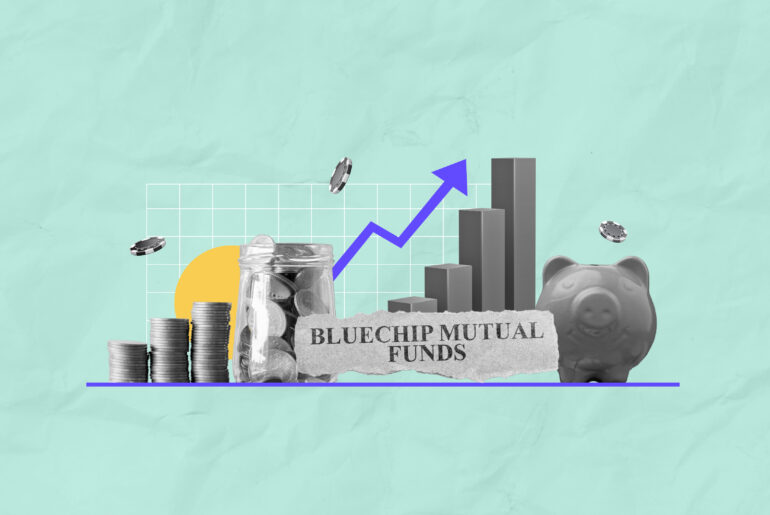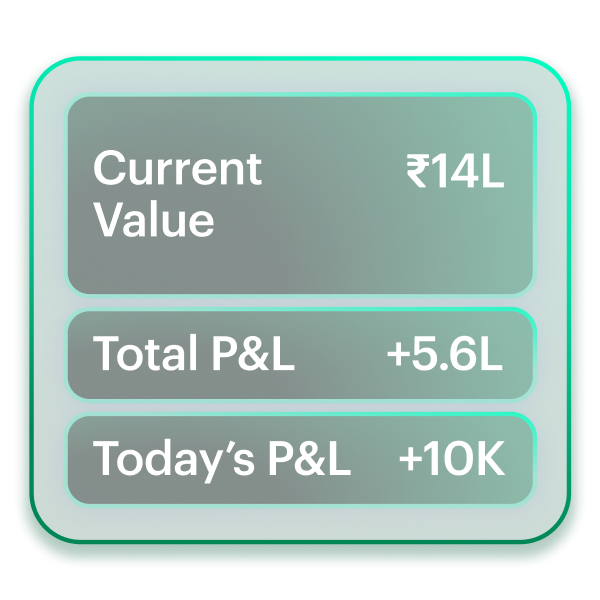Last Updated on Apr 21, 2025 by vanessa sequeira
Equity mutual funds are not just about parking your money in the stock market; they’re about leveraging professional expertise to navigate volatility and capitalise on opportunities. Fund managers rely on a phenomenon called “market timing agility”. This means that they make tactical adjustments to their portfolios, shifting between sectors or stocks based on market trends. In this blog, we’ll explain the meaning of equity mutual funds, their types, features, benefits, and explore the list of the best equity mutual funds in India. Whether you’re planning a SIP in equity mutual funds or a lump-sum investment, understanding these funds is crucial before investing.
Table of Contents
Best Equity Mutual Funds In India
| Name | Sub Category | AUM (Cr) | CAGR 3Y (%) | Expense Ratio (%) | CAGR 5Y (%) |
| Quant Small Cap Fund | Small Cap Fund | 24,892.62 | 19.85 | 0.69 | 49.22 |
| Quant Infrastructure Fund | Sectoral Fund – Infrastructure | 3,158.34 | 17.72 | 0.75 | 42.07 |
| Nippon India Small Cap Fund | Small Cap Fund | 55,490.73 | 21.06 | 0.74 | 39.48 |
| ICICI Pru Commodities Fund | Thematic Fund | 2,614.85 | 14.25 | 1.22 | 39.26 |
| ICICI Pru Infrastructure Fund | Sectoral Fund – Infrastructure | 7,213.94 | 28.28 | 1.17 | 38.26 |
| Bandhan Small Cap Fund | Small Cap Fund | 9,516.16 | 26.52 | 0.5 | 37.40 |
| Bank of India Small Cap Fund | Small Cap Fund | 1,574.18 | 19.47 | 0.48 | 37.11 |
| Bandhan Infrastructure Fund | Sectoral Fund – Infrastructure | 1,563.07 | 26.27 | 0.88 | 36.65 |
| Motilal Oswal Midcap Fund | Mid Cap Fund | 26,028.34 | 25.97 | 0.64 | 36.64 |
| Tata Small Cap Fund | Small Cap Fund | 9,203.23 | 21.55 | 0.3 | 36.18 |
Note: The data is from 21st April 2025. To get this list of public banks in India on the Tickertape Mutual Fund Screener, apply the below-mentioned filter.
- Category > Equity – Select all
- Plan: Growth
- CAGR 5Y: Set to High – Sort from highest to lowest
Details Of Top 3 Equity Mutual Funds
Quant Small Cap Fund
Managed by Quant Money Managers Limited (QMML), the Quant Small Cap Fund focuses on identifying high-growth potential companies in the small-cap segment. QMML, incorporated on December 12, 1995, received SEBI’s approval to function as the Asset Management Company for Quant Mutual Fund on October 30, 2017. Among the top equity mutual funds for 2025, the fund is known for its dynamic approach and aims to deliver superior returns through aggressive sector rotation and tactical allocation.
Quant Infrastructure Fund
Also managed by Quant Money Managers Limited (QMML), the Quant Infrastructure Fund is tailored to tap into India’s rapidly evolving infrastructure sector. With its incorporation dating back to December 12, 1995, QMML was officially authorised by SEBI on October 30, 2017 to manage the Quant Mutual Fund. This scheme aims to capitalise on opportunities arising from government and private sector investments in infrastructure and related themes, qualifying it as one of the equity mutual funds for wealth creation and potentially one of the equity funds with best returns.
Nippon India Small Cap Fund
Backed by Nippon India Mutual Fund (NIMF), one of the top mutual funds in India, this fund offers investors exposure to high-growth small-cap stocks. NIMF operates under a trust structure governed by the Indian Trusts Act, 1882, with Nippon Life Insurance Company as its Sponsor and Nippon Life India Trustee Ltd as its Trustee. Among the high-growth equity mutual funds, the fund leverages extensive research and disciplined stock-picking strategies to generate long-term capital appreciation.
What Are Equity Mutual Funds?
Equity funds are one of the mutual fund schemes which predominantly invest in the shares of the companies. These are also known as growth funds. The fund manager selects the stocks that deliver maximum returns while controlling the risk. Return on equity mutual funds is typically higher compared to debt funds or term deposits. However, there is a certain amount of risk associated with these funds.
Equity-oriented mutual funds invest at least 65% of their total assets in equity and equity-related instruments. The fund manager manages the remaining assets based on the investment scheme and objective. These funds are preferred by investors with long-term goals and those looking for long-term equity fund investments
Types Of Equity Mutual Funds
These funds are divided into several broad categories, as listed below.
Based on market capitalisation
- Large-cap equity funds: These invest in large-cap companies, i.e. top 100 companies in terms of market capitalisation.
- Mid-cap equity funds: These invest in mid-cap companies that are classified between 101 and 250 in market capitalisation.
- Small-cap equity funds: Investors should be aware that small-cap funds are more vulnerable to market volatility and risk and are often considered high-growth equity mutual funds.
- Multi-cap funds: These invest in stocks with various market capitalisations depending on market conditions.
Based On Investment Strategy
- Theme and sectoral funds based on investment strategy: An equity fund may follow a particular investment theme, such as an international market or an emerging market. Some schemes may also invest in a specific market sector, such as Banking, Financial Services and Insurance (BFSI), IT, or pharmaceuticals. It’s worth noting that sector or theme-based funds incur a higher risk because they focus on a particular area or theme.
- Focused equity fund: This fund invests in up to 30 equities of companies with market capitalisations that are specified at the time of the scheme’s commencement.
- Contra equity funds: These types of equity investment funds focus on underperforming equities in the market and buy them at bargain prices with the expectation that they will rebound in the long run.
Based On Tax Treatment
- Equity Linked Savings Program (ELSS): These funds are the only equity schemes that offer tax benefits under Section 80C of the Income Tax Act. ELSS plans come with a 3-year lock-in period, making them among the top equity funds for tax savings.
- Non-tax saving equity funds: All other equity funds, except for ELSS, are non-tax saving plans. This means that the profits are taxable as capital gains.
Based On Investment Style
- Active funds: These funds are managed by fund managers who select the stocks to comprise the fund. They monitor it carefully for possible rebalancing opportunities to capture maximum returns. Features of mutual funds like active management make these funds attractive to investors seeking higher return on equity mutual funds.
- Passive funds: These funds usually mirror a market index and consist of the same stocks in the same quantity and weightage as the fund’s composition. The fund manager is not involved in the stock selection in these schemes.
How to Invest in Equity Mutual Funds
Investing in the best equity mutual funds India is simpler than you might think. Follow these steps to begin your journey:
- Open a Demat or Trading Account: Start by opening a demat, trading, or brokerage account, which serves as the platform for your investments.
- Explore and Choose the Right Fund: Research different equity mutual funds to identify the top-performing equity funds that align with your financial goals. Tools like the Tickertape Mutual Fund Screener can help you analyse a fund’s past performance and fundamentals for informed decision-making.
- Select the Investment Mode: Once you’ve chosen your fund, specify the investment mode—Systematic Investment Plan (SIP) or a lumpsum amount—and proceed to invest by following the instructions on the platform.
- Complete KYC Compliance: Provide your Know Your Customer (KYC) details, including your PAN and bank information, to finalise the investment process.
Features Of Equity Mutual Funds
The features of equity-oriented mutual funds in India are:
- Low expense ratio: According to the Securities and Exchanges Board of India (SEBI), the expense ratio of equity funds should not exceed 2.5%, making them attractive options for those looking for mutual funds with the best returns.
- Tax exemption: A tax exemption is provided in the case of ELSS funds (Equity-Linked Savings Scheme). These funds are among the best equity mutual funds for long term investments due to their tax benefits and 3-year lock-in period, the shortest among tax-saving schemes.
- Diversified portfolio: The best equity funds for SIP provide exposure to various schemes, even for small investment amounts. This helps investors diversify their portfolios across the top-performing equity funds with the best returns.
Benefits Of Equity Mutual Funds
Here are some benefits of investing in the top equity funds in India:
- Professional fund managers handle your portfolio, ensuring optimal growth by investing in top return mutual funds.
- ELSS funds provide tax exemption benefits, making them among the best equity mutual funds for tax efficiency.
- SIP options allow you to start with as little as Rs 500 per month, making investments in the equity mutual funds for growth accessible to everyone.
- A diversified portfolio offers exposure to multiple sectors and schemes, ensuring you are invested in the best equity mutual funds for long term goals.
Equity Mutual Fund Taxation as per the 2024 Budget
Understanding the latest tax regulations on equity mutual funds is essential for making informed investment decisions. The Union Budget 2024 has introduced significant changes to the taxation of equity mutual funds, simplifying the tax structure while altering rates and benefits.
Here is a detailed breakdown of the new tax rules:
- Tax-Free Limit: Gains up to Rs. 1.25 lakh in a financial year remain tax-free. This limit has been increased from the previous threshold of Rs. 1 lakh.
- Tax Rate: Any gains above Rs. 1.25 lakh are taxed at a flat rate of 12.5%. It was previously taxed at 10%.
- Indexation: It’s important to note that the benefit of indexation, which previously allowed investors to adjust the purchase price of their assets for inflation, has been removed for all asset classes, including equity mutual funds.
| Capital Gains Tax | Holding Period | Old Rate | New Rate |
| Short-Term Capital Gains (STCG) | Less than 12 months | 15% | 20% |
| Long-Term Capital Gains (LTCG) | More than 12 months | 10% | 12.50% |
No Indexation Benefit: This change affects the overall tax liability, potentially increasing it for long-term investors.
Equity vs Debt Mutual Funds
Though equity funds and debt funds belong to the mutual funds family, there are a few differences between these. Equity funds mainly invest in stocks of companies, while debt funds invest in fixed-income securities like Certificates of Deposit (CD), Bonds, government securities and various other debt instruments.
How to Choose the Best Equity Mutual Funds for Investing
Selecting the best equity mutual funds requires careful consideration of several factors:
- Define Your Financial Goals: Assess your investment objectives, such as wealth creation, retirement planning, or education funding, to identify funds that align with your goals. Equity investment typically works best for long-term financial goals due to its potential for higher returns.
- Analyse Fund Performance: While past performance doesn’t guarantee future returns, it provides insight into how well the fund has performed across market cycles. Look for funds with consistent returns on mutual funds over a period of 5–10 years.
- Evaluate Fund Manager Expertise: Assess high-return equity mutual funds managed by experienced professionals with a proven track record of delivering strong equity investment results.
- Assess Risk and Volatility: Different equity funds come with varying levels of risk. Evaluate the fund’s risk profile and volatility to ensure it aligns with your risk tolerance.
- Expense Ratio and Fees: Lower expense ratios mean a larger portion of your returns stays with you. Compare fees across funds to find the best equity mutual funds for long-term and for cost efficiency.
- Use Screening Tools: Tools like Tickertape allow you to filter and sort funds based on returns, risk, and other criteria to help you choose the best equity mutual funds.
Risks Involved While Investing in Equity Mutual Funds
While investing in equity funds offers the potential for high returns, it also comes with certain risks:
- Market Risk: Since mutual funds equity investments are linked to the stock market, their performance fluctuates based on market movements. Adverse market conditions can impact the value of your investment.
- Volatility Risk: Equity markets are inherently volatile. Short-term fluctuations can result in temporary losses, making equity investment suitable for long-term investors who can weather market ups and downs.
- Sector-Specific Risk: Funds focusing on specific sectors or themes can face concentrated risks if those sectors underperform. Diversifying across mutual funds equity categories can help mitigate this risk.
- Liquidity Risk: While mutual funds offer higher liquidity than many other investments, certain equity funds may face liquidity constraints during volatile market conditions.
- Fund Manager Risk: The decisions made by the fund manager significantly influence the returns on mutual funds. Poor management can lead to underperformance compared to benchmarks.
By understanding these risks, you can make informed decisions when choosing and investing in equity funds, ensuring your portfolio aligns with your financial goals and risk tolerance.
To Wrap it Up
Investing in equity mutual funds is a smart way to achieve long-term financial goals while benefiting from market growth. By choosing the best equity mutual funds and leveraging options like SIPs, investors can benefit from professional fund management, and potentially high returns. Understanding the features, benefits, and taxation rules is key to making informed decisions. Whether you’re a seasoned investor or a beginner, equity mutual funds remain a versatile and rewarding investment choice.
FAQs
What is an equity fund?
An equity fund is a mutual fund scheme that invests in companies’ stocks.
Which equity mutual fund is best?
You can use the Tickertape Mutual Fund Screener to find the best equity mutual funds. You can follow the steps below.
1. Login to your account
2. Go to Tickertape Mutual Fund Screener
3. Select “Equity Mutual Funds” in the category
4. Add additional filters like 5 yr CAGR, NAV, Expense Ratio, 3 yr CAGR, and more if needed
5. Analyse the funds as per your requirement
Who should invest in the equity funds?
Equity funds are preferred by investors who are looking for long-term investments. However, it depends on the investor’s investment goal, time period and risk appetite.
Is equity mutual fund safe?
Equity mutual funds carry market-related risks as they invest primarily in stocks, but they can offer higher returns over the long term.
What is the ideal investment duration for an equity mutual fund?
The ideal investment duration for equity mutual funds is 5-10 years or more, as this allows you to ride out market volatility and achieve potential long-term growth.
- Best High Return Mutual Funds in India This Year Based on CAGR - Apr 22, 2025
- Best Equity Mutual Funds in India (2025) | Top Equity Funds - Apr 21, 2025
- Best Mutual Funds for Children – Investments for Children’s Future - Apr 21, 2025




